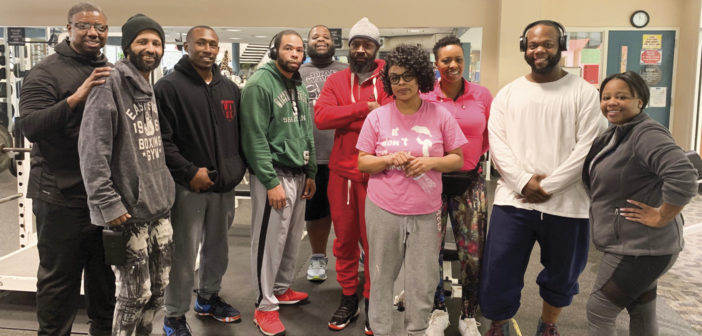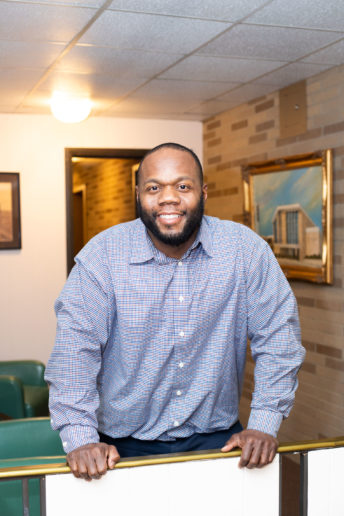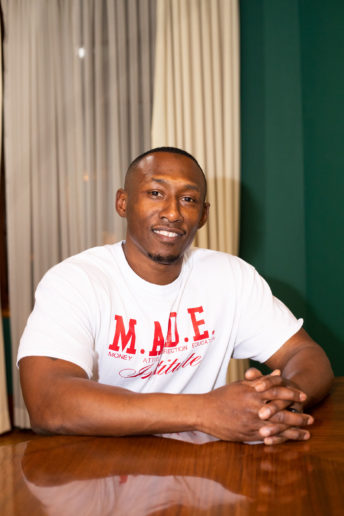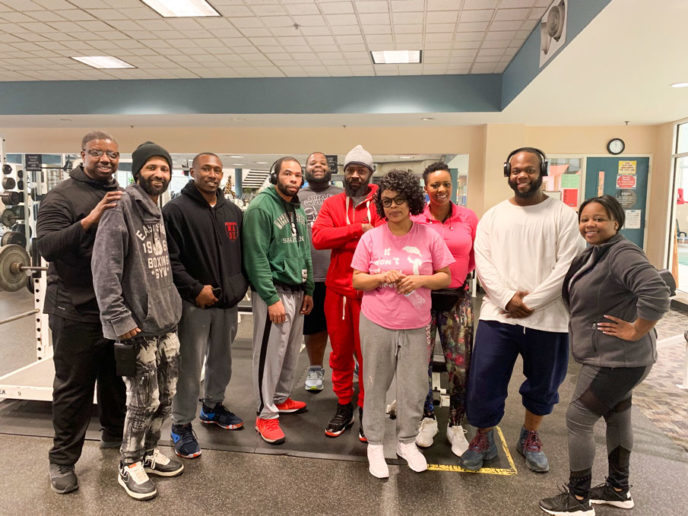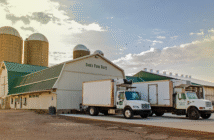In 2010, Leon Abdullah El-Alamin and Timothy Abdul-Matin began the transition back to society after spending several years in prison. They came back to Flint with a new outlook on life. “I realized, during my incarceration, just how much damage my early lifestyle did on the community, my family, friends and myself,” says El-Alamin. “In prison, I transformed my thinking patterns and made the conscious decision to come back and be a positive advocate for my community.”
Both El-Alamin and Abdul-Matin immediately encountered barriers. They had trouble getting housing, jobs and community acceptance, all due to their previous lives. They were denied entrance to schools and denied by multiple temp agencies. Through it all, the two friends remained positive. “We decided to attend council meetings and get involved with positive organizations. We started doing community clean-ups and tried to shake the stigma,” says El-Alamin. “It felt like we were still being sentenced. We understood that it wasn’t going to be easy and that we had to work and earn acceptance. Eventually, we realized that we were going to have to create our own opportunity.”
In 2014, El-Alamin founded the M.A.D.E. Institute, a 501c3 non-profit. “M.A.D.E. stands for Money, Attitude, Direction and Education,” he explains. “Our mission is to provide comprehensive programming for returning citizen population, at-risk youth and veterans in the areas of work-force development, transitional housing, urban farming and entrepreneurship. The goal is to be a one-stop shop for people who are coming back into society to get their life back and become contributing community members.” “It’s what our world needs,” says Program Manager, Abdul-Matin. “M.A.D.E. Institute is about lifestyle change. One thing that I realized when I was serving my time, is that the way I dealt with adversity was different. I had been taught the wrong way to deal with hard times. You can reverse that by teaching and cultivating better life skills.”
Since then, the two have moved forward and touched the lives of over 500 people in a positive way. “Each year in Genesee County, there can be between 200 and 500 people coming back to the area from prison, jail and so forth,” says El-Alamin. “We wanted to be proactive and provide some safety nets for these people.” Abdul-Matin echoes, “there is a need for community support groups for them. We just don’t have the capacity to help them all. It hurts when you see someone who you could help, but you just can’t get to them.”
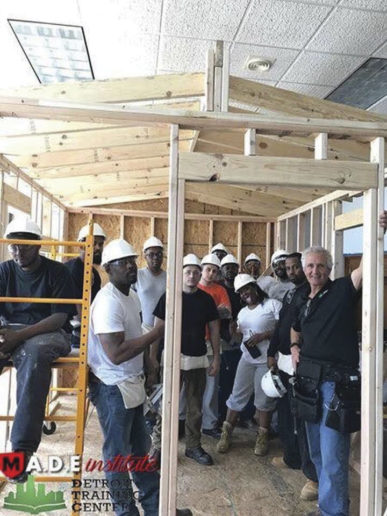
Vocational Training
The Institute partners with Michigan Offender Success to identify those who will soon be released back into Flint and Genesee County. The program offers a Reentry Care Package that consists of personal hygiene components, up to three outfits, casual shoes and maybe work boots – it depends on the specific needs of the individual. M.A.D.E. also provides help to get a legal I.D., birth certificate or food stamps. “We created the care package because as soon as you come out of prison, if you don’t have any support, you basically have just the clothes on your back and your shoes,” says El-Alamin. “Often, you don’t have an I.D. or even transportation. We want to help eliminate any excuse an individual might have to get back on the wrong path.”
The main component of the M.A.D.E. program is the ten-phase life skills mentoring course – a peer-to-peer program that covers conflict resolution, anger management, financial literacy, parenting and more. In March 2018, M.A.D.E. opened their first transition house, made possible by a grant from the Ruth Mott Foundation, for those who have nowhere else to go. Since opening, the house has hosted 12 people. Six have completed the life skills program and are all gainfully employed. Of those 12, none have re-offended. Through a partnership with the Community Foundation of Greater Flint, a community garden was established at the house which, this summer, will include a hoop house. A training program is being developed to teach previously incarcerated individuals and at-risk youth about nutrition and the importance of healthy, fresh foods.
In addition, the Institute offers vocational skills training in partnership with the Michigan Department of Health & Human Services, Detroit Training Center and Michigan Works! Recently, the State provided funding for a class of 15 to undergo a six-week course in skilled trades. Enrollees received certifications in lead and asbestos abatement, OSHA 10, demolition, carpentry and window replacement and installation. Of the 15 enrollees, 13 are currently employed earning hourly wages up to $18. “Once we get funding, we create a curriculum that addresses the current needs of the area job market,” informs El-Alamin. “We are training them for a job that exists in our community and we work with contractors, unions and organizations to get them employed.” Abdul Matin adds, “one of our participants just got his Commercial Driver’s License and he’s on the road. This man made a complete lifestyle change. What better way to get him acclimated to society? He’s earning legal money, learning and building relationships. That’s what it’s about – creating opportunities.”
“When a person gets out, they really have a
very small window to get everything right.”
Timothy Abdul-Matin
With a grant from Genesee Health Plan, the Institute recently launched a pilot health and fitness program. Enrollees work with a task force that includes a physician, nutritionist, fitness instructor and a health insurance navigator. The program has been a great success and El-Alamin would love to expand it in the near future.
This summer, the Institute will open a second transition house, this one for women, located within a block of the first facility. Plans are in the works for at least two more transition houses to be completed in the area, with the goal of establishing a campus. Going forward, M.A.D.E. Institute will expand its vocational skills training to include an entrepreneurial program, entitled Self-Made Ventures, as well as a hotline for returning citizens who may be having trouble adapting to the free world. There are plans to acquire a 12-passenger van to help the Institute and other partner organizations provide transportation.
One of the most important future steps for the Institute will be to establish the program within the prison walls. “When a person gets out, they really have a very small window to get everything right. Sometimes it can be as little as two weeks,” says Abdul-Matin. “If we can get them to work on a plan while in prison, to start the program and begin providing support, we can expand that window. They can hit the ground running and that can make all the difference. It’s important.”
El-Alamin, Abdul-Matin and the Institute’s board of directors are working hard to truly make the program all-inclusive, but they realize that they can’t do it without help. The program is in need of volunteers, case workers, assistants, substance-abuse counselors and mental health professionals. “We have people who have suffered tremendous trauma in their lives and some have symptoms of PTSD,” says Abdul-Matin. “They come out with mental health disorders and anxiety and they start self-medicating. We are asking these people to get jobs and deal with authority and they don’t know how. They aren’t getting the help they need and continue to fall through the cracks.”
“We would love reliable funding,” adds El-Alamin. “We have the blueprint – we just need to hire help. Getting more help will make all the difference in the world.”
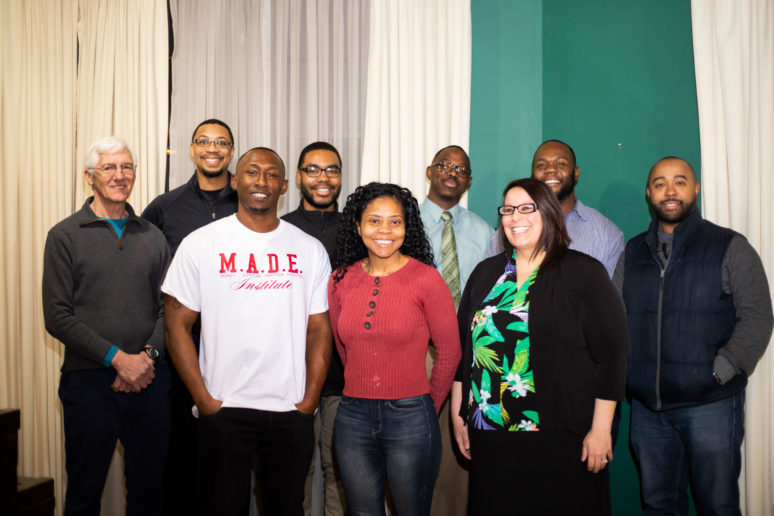
M.A.D.E. Institute board members: (back L-R) Jay Cummings, Dexter Johnson, Milton Straham, Antonio Riggs, Leon El-Alamin, Tauheed Hasan. Front: Tim Abdul-Matin, Tiffany Hughes, Mona Munroe-Younis.
M.A.D.E. Institute is set up to help those who have struggled learn to live in a better way and it is creating positive change; for El-Alamin, however, true change starts with policy. “If we are serious about moving forward in Flint, we have to address the at-risk population. School curriculums need to include more skilled trades,” he states. “We have to diversify our economy and not rely entirely on the auto industry – push forward in renewable energy here. If we think ahead and adjust public policy, we can give ourselves and our youth a chance. We need to stop treating symptoms and start working on the cause. We encourage all of our participants to be politically active and vote if they can.”
Through it all, El-Alamin and Abdul-Matin live and preach the importance of giving back to the community, once you find your footing. “We have to give back,” explains Abdul-Matin. “If I am able to open the door, come through and be established on the other side, I have got to reach my hand back and help the next person through. The more people push through, eventually, that door is going to be wide open. People will be able to see that they can do it and live a clean lifestyle. We have to give that opportunity to everyone.”
If you would like to donate to or volunteer at the M.A.D.E. Institute, visit madeinstitute.org, or call 810.835.8304.
Photography by Kayce McClure

